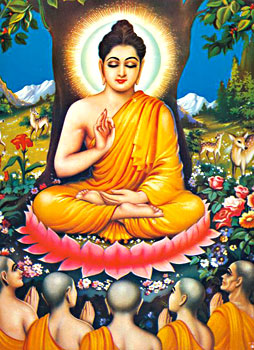"Enmities never cease by enmities. They cease only by non-enmities that is love. This is the eternal law of life." - Lord Buddha
 The same is thought is reiterated in Dhammapda as well. Gautama Buddha had emphasised on the Philosophy of Action in Dhammapada. The first postulate in the Philosophy of Action or `Karmayoga` is non-enmity. He believed that a pre-requisite for progress on the path of righteousness is non-enmity and non-violence. As long as one does not quit his tendency of enmity, he cannot be happy. But this is one of the most difficult passions of mankind. It cannot be stilled by counter attack. Tendencies of enmity, hatred and anger cannot be calmed down by counter-tendencies. The only way to calm down them is to give up the tendency of enmity and hatred altogether.
The same is thought is reiterated in Dhammapda as well. Gautama Buddha had emphasised on the Philosophy of Action in Dhammapada. The first postulate in the Philosophy of Action or `Karmayoga` is non-enmity. He believed that a pre-requisite for progress on the path of righteousness is non-enmity and non-violence. As long as one does not quit his tendency of enmity, he cannot be happy. But this is one of the most difficult passions of mankind. It cannot be stilled by counter attack. Tendencies of enmity, hatred and anger cannot be calmed down by counter-tendencies. The only way to calm down them is to give up the tendency of enmity and hatred altogether.
In order to quit the tendencies of enmity, revenge, anger and hatred says Buddha one has to control the mind. Buddha in the first gatha of his Dhammapada has said, "Mind is the forerunner of Dhamma (Dharma) that is mental natures or qualities. Mind is the chief. The qualities are made up of mind. If a man speaks or acts with an impure mind, affliction follows him as the wheel follows the feet of the ox which draws the cart.
Lord Buddha had been inspired by several other religious texts, like, the Upanishads. Religious texts like the Upanishad had stated that one sees and hears through the mind. Desire, determination, doubt, faith, want of faith, steadfastness, lack of steadfastness, shame, intelligence and fear-all these are truly the mind. Hence it can be said that mind is the main organ of attention. It is the internal organ which joins itself to the objects of organs. In the absence of this organ of attention, the eyes and other organs fail to perceive to do so. Hearing, seeing and the like are not possible when the mind remains engaged elsewhere.
It is very evident from the Dhammapada that Lord Buddha believed in the theory that control of the mind would lead to salvation. He insisted on the discipline of the mind along with the discipline of the action.
The doctrine of Buddhism states about non-enmity that victory breeds enmity because the vanquished lives in pain. But at the same time the tranquil man who gives up both victory and defeat is contented and happy. It has also claimed that one who seeks his own pleasure by inflicting pain on others is entangled in enmity and he would never be free from enmity. It has emphasised on the fact that unless an individual is able to get rid from all kinds of negative emotions including enmity, lust and malice one will not be able to experience the ultimate Peace of life that is Nirvana.
Dhammapada has insisted on the fact that the sages who are non-violent and who always control their body will attain the changeless state where having reached there will be no suffering. Buddha through the Dhammapada has said that an individual who does not utter anything and remains calm at all situations is sure to attain Nirvana. Rather it can be said that Buddha in this section of Dhammapada had emphasised on the element of tolerance. He had said that even if someone is inflicted with pain he should not retaliate and that is the best way to eliminate hatred.
At the same time the Lord had emphasised that compassion and non-violence are the cornerstone of non-enmity. Unless an individual feels the same compassion as he feels for his own self he will not be able to walk in the path of non-violence. As a man starts feeling the same compassion for everyone around him he will not inflict pain to anyone and in the process he also practices the virtue of non-violence. According to him the first requisite for the discipline of action is non-violence. Finally Lord Buddha has concluded saying that one has to quit enmity, hatred, anger and all other such tendencies and should overcome anger by non-anger, evil by good, greed by generosity and lie by truth.
Hence, it can be concluded saying that Dhammapada says that an individual can achieve Nirvana only when ones mind is emancipated from all kinds of enmity. In other words the best way to attain salvation is to control the mind and guide it in the right direction.




















